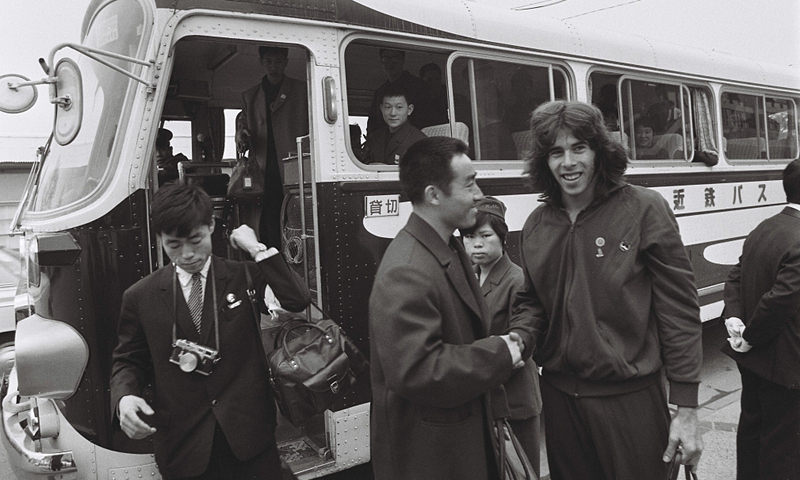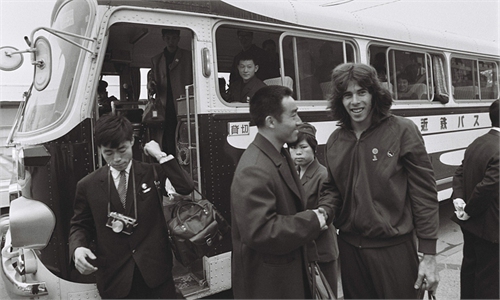
American player Glenn Cowan (right) shakes hands with Chinese player Zhuang Zedong(center) after getting off a bus for Chinese players during the 31st World Table Tennis Championships on April 4, 1971 in Nagoya, Japan. Glenn Cowan, who missed a bus for his own team, accidentally boarded a bus for Chinese players, which led to a domino of events that saw the normalization the China-US relationship. File photo: VCG
Former US president Richard Nixon's opening to China was prepared through quiet diplomacy. Friendly Ping-Pong matches in 1971 prepared the American public for a dramatic change in Asia policy. In fact, Henry Kissinger's trademark "creative diplomacy" was in full swing in that era a half century ago and was with good reason a widely hailed success.
At that time, this writer was preparing to enter graduate studies in the government and foreign affairs department of the University of Virginia. The focus was US foreign policy and Nixon's foreign policy was guided by Kissinger who had a Hollywood like superstar status. The US media fully supported Nixon's opening to China as well as the détente with Russia.
At the time, I was an undergraduate studying foreign affairs. Kissinger's enthusiastic embrace of classical diplomacy and its successful implementation was of great interest. I had taken courses in diplomatic history from the well-known historian professor Norman Graebner. So Kissinger's policy reflected insights from the 1815 Congress of Vienna, and from the European Concert of major powers made sense in its pragmatism and realism.
During these university years, I found the entire world fascinating, so decided to focus on US foreign policy and geopolitics. Perhaps that was a result of looking through the National Geographic and Foreign Affairs magazines that came monthly into my parents' home.
As with many Americans, my late parents were very happy to see Nixon's opening to China. My father, a lawyer, hoped it would lead to peace and to commercial relations. My mother, who was interested in Asian art and floral design, hoped it would lead to increased people-to-people exchanges. My younger brother studied Chinese as an undergraduate while I, however, studied Russian.
Fortunately, I had the opportunity to study Chinese politics and foreign policy under Professor Shao Chuan Leng (1921-2000), who was born in China but became an American citizen after graduate school in the US. He hoped for the establishment of the rule of law in China as well as for the eventual peaceful reunification of China. He was a friend of another influential Chinese-American professor with a similar background, Tang Tsou (1919-1999), who taught at the University of Chicago.
Overall, back in the 1970s, the atmosphere in the US toward improved relations and peace with both China and Russia was hopeful. The key was the ability of the US to engage in creative and effective diplomacy to advance constructive engagement and areas of cooperation with China and Russia.
Fast forward 50 years. What happened?
The simple answer is the militarization of US foreign policy, the endless wars, and the entrenched Cold War mentality.
For realists, there were no surprises about the international system which, as Kissinger and other US experts correctly anticipated in the 1960s, would inevitably become multipolar. So the question was how would US leadership manage foreign policy and national strategy within such a changing international system.
Instead of realistically and prudently calculating US national interests and implementing a competent diplomacy to advance them, Washington chose endless war and military intervention. Thus, US foreign policy was increasingly militarized and US diplomacy was increasingly marginalized.
Since the days of former US President George W. Bush and his Iraq and Afghan wars, the neoconized Republican Party has become ever more belligerent abroad. This is a far cry from the days of the effective quiet diplomacy of Nixon and Kissinger. It is dangerous.
Donald Trump launched an even more belligerent phase of US foreign policy. The incompetent loudmouth Mike Pompeo denounced president Nixon's China policy.
Can the US come to its senses under Democratic Party leadership and President Joe Biden? Can the US formulate and implement a constructive engagement with China?
That remains to be seen. It is too early to tell because it often takes a new administration its first year to settle into office.
But at some point the US must make a serious and necessary effort to stabilize relations with China.
The author is an educator and former senior professional staff member of the Senate Committee on Foreign Relations. opinion@globaltimes.com.cn

